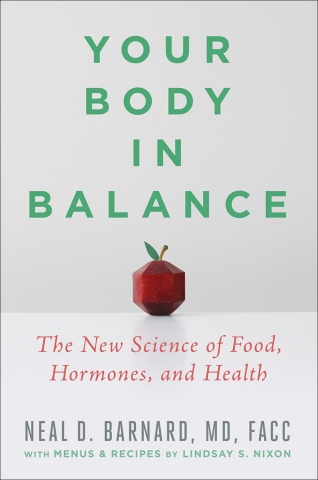WASHINGTON--(BUSINESS WIRE)--Seven mood-boosting tips from nutrition researcher Neal D. Barnard, MD, can help people during the winter months and beyond. In his forthcoming book, Your Body in Balance, Dr. Barnard examines the scientific literature and draws on his own original research and interviews with patients. He finds that a plant-based diet appears to have a mood-stabilizing effect for many people. Dr. Barnard is a faculty member of the George Washington University School of Medicine, a Fellow of the American College of Cardiology, and president of the Physicians Committee for Responsible Medicine—a nonprofit of 12,000 doctors.
“A plant-rich diet can change brain chemistry in such a way as to get our moods on a more even keel,” says Dr. Barnard.
The following mood-boosting tips are from Dr. Barnard’s forthcoming book, available in February 2020. He notes that depression is dangerous and can have many causes and complicating factors, so it’s important to get professional help and to use this information as part of a treatment program, not to replace it.
-
Boost Your Mood with Fruit and Veggies. Two large studies point to the mood-boosting effect of fruits and vegetables. In a study of nearly 50,000 individuals in the United Kingdom, those consuming more vegetables and fruits reported substantially better mental well-being and life satisfaction, compared with others who neglected these healthful foods. And the more vegetables and fruits they ate, the better they did on these measures. Another study in Taiwan examined the diets of 1,609 older adults, finding that those who ate the most vegetables were 62 percent less likely to develop depressive symptoms.
-
Focus on Folate. In explaining the apparent antidepressant effect of plant-based foods, researchers have credited folate, a B vitamin found in broccoli, spinach, asparagus, and many other vegetables, as well as in beans, peas, lentils, and chickpeas. Folate appears to play a role in the synthesis of serotonin, a neurotransmitter involved in moods.
-
Power Up on Plant Protein. It’s easy to get all the protein you need from beans and other plant sources—even if you are an athlete—and avoiding meat is likely to benefit your mood. A large study in Spain found that people eating very little meat were less likely to be hit by depression. The researchers found that diets built mainly from plant sources were associated with a 26 percent reduction in the risk of depression—and there seemed to be a particular benefit from beans, nuts, and fruits.
-
Fill Up on Fiber. Plant foods provide fiber, which gives you a healthier digestive tract. In turn, that seems to protect against depression. Data from the National Health and Nutrition Examination Survey showed that the more fiber people ate, the less likely they were to be depressed. Beans, vegetables, fruits, and whole grains provide fiber, but there is zero fiber in meat, eggs, and dairy products.
-
Enjoy Soy! Soy products like tofu and soy milk contain isoflavones, which may help stabilize mood. Studies suggest that consuming two to four soy servings per day may bring a significant mood-boosting effect. Another reason to choose soy milk over dairy milk is that dairy products contain casomorphins, mild opiates that are released as milk is digested. Swedish researchers discovered that, when highly concentrated, casomorphins can have a dramatic effect on the brain.
-
Calm Inflammation. Inflammatory foods can affect the body, and they may also affect the brain. And that suggests an explanation for the antidepressant effect of plant-based diets—they allow you to steer clear of inflammatory foods. Researchers have suggested that an excess of arachidonic acid, an inflammatory fat found in chicken, eggs, beef, sausage, and fish, can promote inflammation in the brain and interfere with normal brain function.
- Get Your Heart Beating. Studies show that, for many people, exercise prevents and counters depression. Researchers at Duke University in North Carolina compared the antidepressant effect of medication, exercise, or both. The study suggested that exercise was as good as medication. Also, it pays to exercise outdoors, as sunlight is a natural antidepressant.
Your Body in Balance, available for preorder at PCRM.org/YourBodyInBalance, provides step-by-step guidance for understanding what’s at the root of many health issues, practical tips, and 65 hormone-balancing recipes developed by cookbook author Lindsay Nixon.
For photos, recipes, or an interview with Dr. Barnard, please contact Leslie Raabe at lraabe@pcrm.org or 202-527-7319.
Founded in 1985, the Physicians Committee for Responsible Medicine is a nonprofit organization that promotes preventive medicine, conducts clinical research, and encourages higher standards for ethics and effectiveness in education and research.
About the Author
Dr. Barnard is president of the Physicians Committee for Responsible Medicine, a faculty member of the George Washington University School of Medicine, and a Fellow of the American College of Cardiology. In 2016, he founded Barnard Medical Center in Washington, D.C., to create a new model that integrates nutrition into conventional medical care. His federally funded diabetes research revolutionized the nutritional approaches to type 2 diabetes, and he now aims to empower readers with life-changing information on hormones and health. He has written 19 books on nutrition and health.
Your Body in Balance: The New Science of Foods, Hormones, and Health
Grand Central Publishing, Hachette Book Group, Inc.
February 4, 2020

